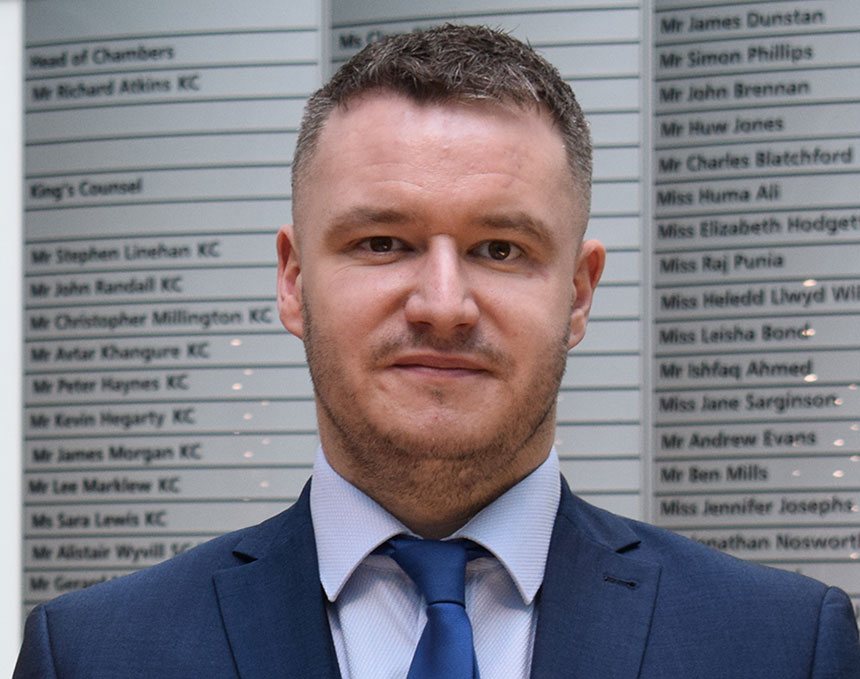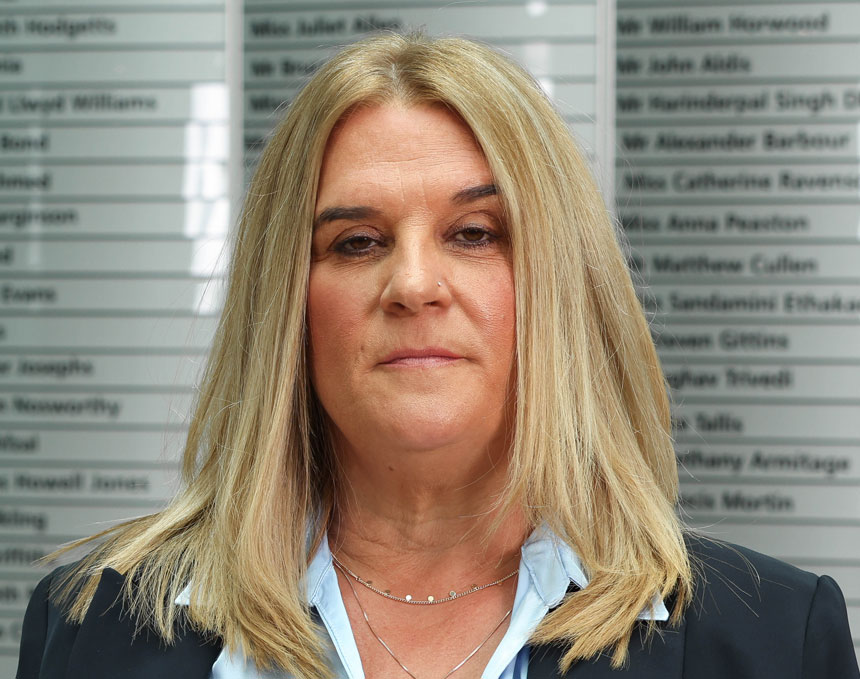Introduction
Lee Marklew KC was appointed Queen’s Counsel on 15th March 2021. He is regularly instructed to appear for both the prosecution and the defence in cases of murder, rape, sexual assault, making indecent images, conspiracy to import drugs, armed robbery, firearms offences, and blackmail. He is often instructed privately by individuals as well as being instructed by unions, such as The National Farmers’ Union and Community (a prison officers’ union), as well as insurers, such as Direct Line.
At the time of his appointment Lee was a Grade 4 prosecutor and upon the lists of approved advocates able to prosecute rape, serious sexual offences, and people trafficking. He is also instructed in many cases of indecency where the alleged victims are children. As Lee often leads other barristers, he has a strong sense of working at the forefront of a team.
Lee specialises in cases that concern allegations of large-scale fraud. In this regard he recently appeared at Birmingham Crown Court in Operation Circus, where high net worth individuals were defrauded of tens of millions of pounds, and he is currently instructed in Southwark in a long-running matter that is prosecuted by the S.F.O.
Having represented local authorities in Trading Standards cases Lee has also lectured Trading Standards Officers upon aspects of their investigative work. Lee is also upon the Health and Safety list and is regularly instructed to appear at inquests.
Serious Sexual Offences
Notable Cases:
- Rape, kidnap, administering a noxious substance and attempting to choke (Bent), defending. The defendant was accused of keeping a law graduate, who had come to Manchester to see old friends, prisoner in his home in a 36 hour period. In that time he had sexually abused her, made her take cocaine, watch pornography and physically assaulted her.
- Indecent Assault (Kiczma), defending. The defendant was a retired mental health social worker accused of abuse of boys in a care home as well as abuse of siblings in a domestic setting. Both sets of complainants did not know each other.
- Rape, (Millward), defending. The defendant, who was seriously ill with stage 4 heart disease, was accused of historical sexual abuse against his step sisters and rape of a woman who had babysat the defendant’s mistress’ children when he was a much younger man.
- Indecent Assault (O’Dwyer), prosecuting against a QC and junior. The defendant was accused of indecently assaulting his daughters during contact visits following acrimonious split from his wife.
- Buggery and sexual assault (R v H), prosecuting. Offences against defendants disabled step son.
- Rape (R v Ibrar and others), defending. Gang rape where a young girl was drugged.
- Rape (R v Grebliauskas), defending. Rape of teenage Lithuanian by fellow national.
- Rape (R v Thomas), defending. Defendant raped his daughter, starved her and made her sleep in her own urine. Rape (R v Matsveiro), prosecuting. Trial of a serial rapist who attacked three prostitutes.
- Rape and Section 18 (R v Ramlal), prosecuting. The defendant lured his victim to England from India. He enslaved her, raped her and then stabbed her outside a women’s refuge.
- Buggery (R v Corrick), prosecuting, leading junior. Sexual abuse of boys in care homes between 1970 and 1997.
Inquests and Coronial
Over the last ten years Lee has appeared in a number of inquests representing families and other interested parties. He has dealt with a wide range of evidence involving complicated expert evidence for the purposes of reconstruction. After the hearing one family expressed their satisfaction that the proceedings had enabled them ‘to do right’ by the deceased and said of Lee this feeling was ‘was all down to you and the effort you put in. We will always count ourselves fortunate to have had you on our side’ Foot Anstey solicitors ‘I now know who to use for another inquest.’
Notable Cases:
Shrewsbury Coroner’s Court
Lee represented the Care Quality Commission, an interested party, in an inquest which concerned the death of a young man who exsanguinated during dialysis whilst in hospital. The accident occurred when the venous alarm upon the dialysis machine was reset at a time when the operator did not check/ notice that the venous line had become disconnected.
Nottingham Coroner’s Court
Lee represented an interested party who had been the subject of a criminal investigation.
The inquest centred about the death of a schoolgirl following neglect by her Aunt. The client was extensively questioned by the coroner upon the issue of whether she and/or others had perverted the course of justice by covering up errors and/ or omissions in relevant school records.
Truro Coroner’s Court
Lee was asked to represent the family of the deceased following his death at work in circumstances that led to two of his colleagues being interviewed upon suspicion of manslaughter. The deceased was a linesman replacing overhead wires on a hillside in woodland at night. His pole, which was rotten below ground, had fallen as a result of a shock loaded tension imbalance when wires between it and an adjoining pole were cut. The first of the two colleagues interviewed by the police had cut the wires that caused the tension imbalance. His account, supported by others present, was that the deceased had told him to cut them. This was an assertion that the family did not accept given the obvious danger of giving such an order. The second of the two colleagues was asserted by a subcontractor to have deliberately decided not to replace the rotten pole when the work was initially planned. That accusation was denied by that colleague.
In front of a jury Lee fully examined the issue of whether there had been a ‘cover up’. In addition he robustly questioned the working methods of the company, Western Power Distribution, that were and should have been employed. The coroner accepted, following contested legal argument, that these inquiries were concerned with the last link in the chain of causation and were not outside the scope of the inquest. The hearing took eight days and seven counsel attended to represent the various interested parties. Lee, who is a grade 4 prosecutor, was able to draw upon his experience in the criminal courts when questioning the witnesses as to what had actually occurred before the police took statements for the purposes of the criminal investigation.
Telford Coroner’s Court
Lee appeared at an inquest into the death of a couple who burned to death after their car caught fire following a road traffic accident. The collision occurred when the driver of the deceased’s car exited a junction because he did not see a ‘Give Way’ sign hidden by foliage. The deceased was driving his grandchildren home and the children witnessed both his death and the death of his wife. Lee represented the driver of the vehicle that collided with the deceased’s car. He asked questions of witnesses from both the highway maintenance company and the car manufacturer whose work was under scrutiny. The hearing took place amidst scenes of acute acrimony between the parties that led to arrests being made at court. Members of the deceased’s family clearly blamed Lee’s client for the tragedy when on any view the client himself was traumatised by what had happened and had done his best to avoid the accident. At the conclusion of the hearing Lee’s client thanked him for his support and for ‘standing firm’ in what was a highly emotive arena.
Stourbridge Coroner’s Court
The deceased fell from a low level first floor window in a hotel that had been built in the eighteenth century. Whilst a verdict of accidental death was virtually inevitable the case raised issues about when restrictors and safety bars should be fitted to windows in public premises. Lee met with the family in advance of the hearing and discussed the questions that they wanted asking, the possible causes of the fall as well as alleged lies told by witnesses during the course of the investigation. Afterwards he was thanked by the family for questioning the hotel owner in a precise and forthright way. They also remarked that Lee ‘did a fine job in representing me and my family on the day’.
Trading Standards, Consumer Protection & Food Safety
Lee has represented many local authorities, individuals and companies in a wide range of cases and a number of high profile cases. He has developed a reputation for clear thinking and a methodical and analytical approach to expert evidence. He quickly acquires an understanding of working systems and production processes. He has an ability to grip the issue and focus upon the reality of working directives in practice. He appeared as prosecution junior counsel in a two week trial of Superdrug plc. The case concerned allegations that the company was selling dangerous sun care products which were labelled ‘Happy Faces Baby Faces.’ The company was alleged to be acquiring and selling products from the United States which did not contain the requisite sun protection factor (S.P.F.) in the United Kingdom. The case required an understanding of the differences in the composition of sunlight in different geographical locations. Expert evidence was called by the leading scientists in Europe and the United States. In addition the court heard from Dr Young, the world’s leading expert upon the link between over exposure to sunlight at a young age and cancer.
In addition Lee has prosecuted other multinational companies such as Lidl for selling food products which were misdescribed in terms of the quantity of water within the product and its origin.
In 2015 Lee also defended a four week case concerned with the systematic alteration of readings shown on odometers of over 100 cars which were acquired by car traders and sold with false particulars. The prosecution by Birmingham City Council was the biggest of its type, in terms of the number and value of the vehicles with which it was concerned.
Lee has also defended cases concerning the manufacture of children’s clothing and the adequacy or otherwise of fire retardant upon children’s toys.
Notable Cases:
- (Worcester CC v Superdrug), prosecuting. Trade description offences relating to a sun care product that was specifically marketed as a cream providing adequate protection for children. The issues in the case encompassed the validity of the test methodology employed in testing the product, the difference in the composition of sunlight between locations at different latitudes and longitudes and the heightened risk of developing cancer if over exposed to sunlight as a baby or at a young age. The case was reported nationally as the prosecution alleged that the cream was a dangerous product.
- (Shropshire CC v Solar Cosmetics ltd). Trade description offences relating to a sun care product that was said to be misdescribed in terms of the sun protection factor S.P.F. that it was capable of providing.
- (Worcester CC v Lidl), prosecuting. Lee prosecuted the company for offences under the Food Safety Act. The company was charged with allegations that a mechanically extracted chicken product was misdescribed and contained an unlawful quantity of water. The company relied upon a defence of due diligence blaming the actions of a third party from whom the goods had been sourced.
- (Warwickshire CC v Andrew Fern), defending. Lee defended a shopkeeper for manufacturing and selling counterfeit DVDs. The case concerned the large scale copying of Hollywood films. The defendant had been found in the possession of over 1000 items which were being sold ‘under the counter’ at his shop premises.
- (Coventry CC v Ahmed), defending. Trademarks offences/ counterfeit clothing. The case concerned the selling of counterfeit clothing at a local market which infringed the trade marks of Hugo Boss and other well known premium brands.
- Aitchison, defending. The defendant had set up a business which ostensibly offered a dating service as well as the services of male escorts. The prosecution alleged that the defendant was operating an advance fee fraud and that services provided were misdescribed upon marketing material and subscription forms. The case was particularly serious as the defendant specifically targeted disabled individuals as part of his offending.
- Mahmood, defending. This four-week trial concerned a conspiracy to ‘clock cars’ by a number of car traders who were operating a systematic fraud upon the public. Cars were bought using bogus particulars, the readings were altered using specialist equipment, MOT certificates were issued by ‘friendly’ garages and advertisements were placed using ever changing contact numbers. The alleged profit was more than £100,000-00 and was made upon second hand vehicles with a derisory intrinsic value.
- (Coventry CC v Goff), prosecuting. An estate agent’s business which provided sellers and prospective purchasers with false particulars, including inflated figures in respect of square footage to enhance the prospects of sale.
Fraud, Business and Financial Crime
- Fraudulent Trading, defending in silk. Lee is currently instructed in a long running case which concerns allegations that trade finance banks were defrauded by a commodity trader in the city of London. The case is prosecuted by the S.F.O. and the alleged losses are more than £300 million.
- Fraud by false representation (R v Williams and others), defending in silk. The defendant and 5 others made fraudulent representations to high-net-worth individuals defrauding the victims of more than £60 million. They represented themselves as financial experts, purported to have experience of ‘bullet trades’ and they attempted to launder their ill-gotten gains by diverting the same to a bank in the U.A.E. before sending the funds back to the U.K.
- Conspiracy to defraud (R v Webb and others), defending as a leading junior. This was an HMRC fraud wherein the defendants, who ran several companies, defrauded the HMRC of more than £5 million.
- Fraud by false representation (R v Chauhan and others), defending against 2 prosecution counsel. The defendant worked for a property company which along with others filed false bids for the purchase of houses owned by Severn Trent Water. The prosecution alleged that the defendants were ‘hand in glove’ with the business manager at the complainant company and between them acquired more than 20 properties at a discounted value. Those properties were then sold on for significant profits.
- Conspiracy to defraud (R v Nightingale), defending. Represented one of 14 defendants who defrauded the government of more than 1 million. They created several companies that purported to provide educational services to the unemployed, under privileged and disabled.
- Conspiracy to defraud (R v Stevens), prosecuting, led. Advised and drafted a 13-count indictment against the three accused. Consideration of how many conspiracies to defraud should be alleged and the service of additional evidence.
Lee also has experience in cases of fraudulent trading and mortgage fraud. He has defended company directors for prosecutions undertaken by The Official Receivers Office in respect of the Insolvency Act 1986. He has been instructed in multi-handed cases where the sums have regularly run into millions of pounds.
Organised Crime and Terrorism
Notable Cases:
- People trafficking (R v Jiang, R v Liu and R v Sultan), defending.
- Armed Robbery (R v Richardson and others), prosecuting. A gang using stolen cars on false registration plates robbed a jeweller’s shop in Birmingham and attacked the shop workers with hammers whilst wearing masks to disguise their identities.
- Conspiracy to supply class A drugs between London and Birmingham (R v English), defending.
- Conspiracy to blackmail (R v Wysiecki), defending. Polish extortion racket.
- VAT fraud (R v Gill), defending, leading junior.
- Armed robbery (R v Cutler and others), defending, leading junior. Armed robbery by eight defendants, one of whom possessed a firearm and was dressed as a police officer.
- Conspiracy to blackmail (R v Khan and others), prosecuting. Extortion racket where a firearm was discharged.
Armed robbery of a bank with a firearm (R v Aslam), prosecuting.
- Conspiracy to convert firearms (R v Bashir and others), prosecuting.
Homicide (Murder and Manslaughter)
Notable Cases
- Murder (R v Huburn), defending in silk. The defendant was one of 9 members of a drugs’ gang who attacked and killed a member of a rival gang by stabbing him. Convicted of manslaughter
- Murder R v Swaby), defending in silk. The defendant killed an associate by repeatedly stabbing him for being in the defendant’s mother’s house. There were more than 80 knifepoint injuries.
- Murder (R v Moore), defending, led. The deceased was stabbed during a violent disorder.
- (R v Turley), prosecuting led. The deceased was stabbed in the street after the defendant returned home after a night out only to go back outside with the knife.
- Murder (R v Bailey), prosecuting, led. The deceased was killed by a stranger who she had met after she had met after she had left a nightclub. The defendant said that her death was an accident which had occurred during consensual sexual activity.
- Murder (R v Bayliss), defending, leading junior. The defendant had attacked the deceased in his own home before setting the property on fire.
- Manslaughter (R v James), defending, led. A 16-year-old girl who killed her father.
- Murder (R v Laqab), defending, led. Fight between drug dealers where deceased was stabbed through the skull with a screwdriver.
- Manslaughter (R v Cooksey), defending, led. The deceased was killed during a burglary at his home.
- Perverting the course of justice (R v Gay), defending. The defendant, D3, faced trial alongside 2 men, D1 and D2, who were charged with murder. The prosecution alleged that he had disposed of items as part of a clean-up operation after the killing. ‘Cutthroat’ defence emerged between the defendant and D2.
Offences Involving The Use of Motor Cars Resulting In Death Or Serious Injury
- Death by dangerous driving (R v Vranjes), defending. The defendant drove her car home in the dark after a day at work. In doing so she failed to see a 6 year old on a pedestrian crossing at a time when the prosecution said the lights were showing in the child’s favour.
- Causing Serious Injury By Dangerous Driving (R v Cooke). The defendant had driven his car along the hard shoulder of a motorway and struck the victim’s car just as he got out of it. Fortunately V was flung into the carriageway or he would have lost his life.
- Death by dangerous driving (R v Firulescu), prosecuting. The defendant drove his car at more than 60mph in a 30 mph residential area and failed to see the deceased on a pedestrian crossing.
- Causing grievous bodily harm with intent (R v Purcell), prosecuting. The defendant used his car as a weapon and rammed the victim’s vehicle off a motorway into a wooded area. The victim suffered life changing injuries. The defendant’s plea to causing serious injury by dangerous driving was rejected by the jury which found that he had committed an offence of specific intent.
- Death by dangerous driving (R v Moran), defending. The defendant, whilst impaired through drink, lost control of his vehicle on a dual carriageway which led to the death of his friends who were inside the car.
- Death by careless driving ( R v Tombs ), defending. The defendant was an Iceland truck driver who failed to see the deceased because of the way in which his Satellite navigation system was positioned on his windscreen. The case was subsequently reported as it raised a point of principle in relation to disqualification periods.
Health & Safety, Corporate & Gross Negligence Manslaughter
Lee has prosecuted and defended a large number of cases in this area. He has defended a Go-Kart company prosecuted as a result of an accident resulting from oil that hadn’t been cleaned from a tarmac track and a jewellery business following an employee bypassing safety guards and being pulled into a lathe. In addition he also prosecuted Tesco plc following a lady breaking her leg after she slipped upon yoghurt that had gotten onto the floor in the public area of one of the company’s supermarkets.
Environmental
Lee has experience of both prosecuting and defending in these cases. He has a particular interest in the unlawful disposal of waste and consequential proceedings for confiscation as a result of the benefit accrued from avoiding the levies that would have been imposed had the waste been disposed of lawfully.
Notable Cases
- Parsons, defending. The defendant had allowed waste to be disposed of in a specially constructed pit on his land in an isolated rural area. The waste consisted of a mixture of plastic framed windows and metallic objects that were not bio-degradable. The clean up operation cost £80,000-00, such was the size of the deposited waste, but the defendant avoided confiscation proceedings.
- The Crabbe Yard, prosecuting. The defendant, who was a concrete manufacturer, polluted the environment with smoke and fine ground powders used for making cement despite statutory notices being served upon the company.
Animal Welfare
Lee prosecuted the biggest prosecution, in terms of animal welfare, ever conducted by Worcester City Council (Worcester CC v Tongue). The three defendants were prosecuted in four separate trials in the Magistrates’ Court and the conjoined appeals were heard over a period of six weeks at Hereford Crown Court.
The three men, who were keepers of livestock, sold an area of land at a sizeable profit. They then acquired further farms with that money and housed upon them herds of cows and bulls. However, none of the animals was given adequate feed, there were no dry lieing areas and too many bulls were put in the same fields as the cows.
Following a spot check by inspectors many of the animals were found to be so emaciated that their bodies were catabolizing their internal organs. Very many of them were also badly injured from being gored because the bulls, which were not de-horned, had fought for the attention of the females. In addition some animals were ill and were suffering from infection. None of the animals was also saleable as they all lacked identifying tags and papers capable of verifying their origin. During the course of their offending some of the animals were shot by the men when vets from the department for the environment and rural affairs attended. Having been convicted in the first three trials the men continued to keep animals although disqualified from doing so and they were then imprisoned. They then lost the appeal and were made to pay a significant amount of costs.
Lee has also been instructed to defend a member of the National Farmers’ Union accused of neglecting his animals, failing to feed them properly and failing to seek prompt veterinary assistance.
Regulatory
Lee has ten years’ experience in defending and prosecuting a range of regulatory cases, including trading standards, health and safety and animal welfare. He has worked on cases involving the production and selling of counterfeit clothing, the adequacy of fire retardant treatment on fabrics, false descriptions in particulars provided by estate agents and the accuracy of descriptions upon labels relating to food products. Cases have involved multinational companies such as Lidl and Superdrug; Department for Environment, Food and Rural Affairs (DEFRA); The Official Receivers Office; Birmingham, Worcester, Warwickshire and Coventry local authorities and the RSPCA.
The principal charges have been brought under the following acts:
- Food Safety Act 1990
- Trade Descriptions Act 1968
- Trade Marks Act 1994
- Insolvency Act 1986
- Health and Safety at Work Act 1974
- Animal Welfare Act 2006
Significant cases:
- (Warwickshire CC v Andrew Fern), defending. Counterfeit dvds.
- (Coventry CC v Ahmed), defending. Trademarks offences/ counterfeit clothing
- (Worcester CC v Tongue), prosecuting. Series Of trials and appeals concerning widespread cruelty to animals on a number of farms
- (Worcester CC v Superdrug), prosecuting. Trade description offences relating to a sun care product
- (Shropshire CC v Solar Cosmetics ltd). Trade description offences relating to a sun care product
- (Worcester CC v Lidl), prosecuting. Offences under the Food Safety Act
- (Coventry CC v Goff), prosecuting. False details in an estate agent’s particulars
- (Birmingham CC v Lockwood and McDonagh), prosecuting. ‘Loan shark’ prosecuted for persecuting 2 heroin addicts
Appointments and Memberships
Queen’s Counsel – 2021
Testimonials
“A fantastic silk. Personable, excellent with clients and his attention to detail is second to none” Richard Ellis (Solicitor)
“Lee Marklew KC is hard working and meticulously prepares his cases. He is highly articulate, and his skeleton arguments, submissions and speeches are deft and thoughtful. He establishes a great rapport with his clients who feel able to place their trust and confidence in him” Sundeep Kumar (Solicitor)
“Lee has a sway with clients and juries. He has a knack that has become familiar in consistently obtaining successful outcomes. His preparation and eye to detail (including Sunday morning conferences) are a testament to his commitment to his client’s and the professionalism in which he operates. He is an absolute pleasure to work with.” Ghulam Sohail (Solicitor)
“He is an amazing advocate and an amazing person… I’m looking forward to working with him as a silk. Bottom line, he is simply class.” Lisa Yates (Solicitor)
“Lee did an excellent job at the hearing today, a cracking result for the client” Regulatory Client
















